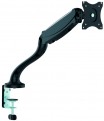Minimum size
The minimum TV screen size that can be mounted on the stand/mount. It is usually indicated for structures with mounts, for stands this parameter is irrelevant (for more details, see "Type"). The parameter is not absolutely accurate, because technically, TVs with a smaller size can fit the mount; however, in general, it allows to evaluate the scope of a particular model of mount/stand.
Max. weight
The maximum weight of the TV that can be installed on the mount/stand; more specifically, it is the maximum weight that the mount/stand can support for an indefinitely long time without any negative consequences. Unlike the screen size described above, this parameter is accurate and should not be exceeded: perhaps the stand/mount will not break immediately under excess weight, but this can happen at any time, and such a breakdown is not covered by the warranty.
It is worth considering that for classic stands with several shelves (see "Type"), the maximum wheight is usually indicated for the entire structure as a whole and is the sum of the loads for each individual shelf. Thus, the maximum weight of the TV is not limited by the total maximum wheight, but by the maximum wheight for one shelf. This does not apply to stands with mounts; they usually list the maximum wheight on the mount, in which case it corresponds to the maximum weight of the TV.
The screen size is directly related to the maximum wheight (after all, a large TV weighs more). Typically, for screens up to 24", structures with a maximum wheight of about 5-6 kg are usually quite enough, for a 32" device, about 12 kg may be needed, large 55" screens reach a maximum weight of about 25-30 kg, and in the case of plasma panels, these figures increase by 1.5-2 times However, anyway, before choosing, you should clarify the weight of the specific TV model for which the stand/mount is selected.
Upward tilt angle
The maximum upwards tilt angle from the vertical of the installed screen. The larger the tilt angle, the wider the adjustment possibilities, however, in fact, an angle of more than 5° is rarely required.
Downward tilt angle
The maximum downward tilt angle from the vertical for the installed screen. As with the upward tilt angle, the larger this angle, the wider the adjustment possibilities; however, downward tilt is usually required more frequently (the TV may be installed under the ceiling), and its angle can be as high as 15-20°.
Cable management
Possibility
of placing the cables connected to the TV inside the rod or support of the mount(for ceiling and floor structures, respectively, see "Type"). This placement gives the whole structure a neat appearance, because cables, often of different sizes and colours, and even tangled with each other, are hidden from view and do not spoil the aesthetics.

